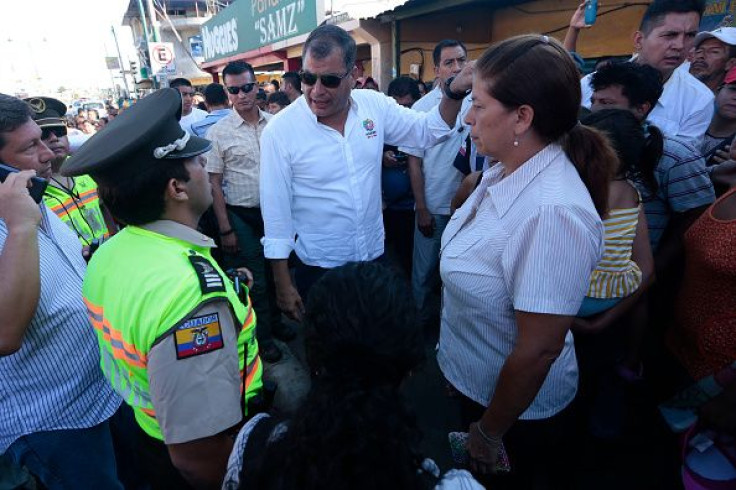Ecuador Earthquakes: President Rafael Correa Ponders Quakes’ Financial Toll

The death toll from Ecuador's weekend earthquake surpassed 500 and rescue efforts ebbed on Wednesday as the traumatized Andean nation braced itself for long and costly rebuilding.
To help fund the multibillion-dollar reconstruction of homes, roads and buildings in the devastated Pacific coast region, Ecuador will temporarily increase some taxes and may issue new bonds on the international market, a somber President Rafael Correa said.
"It's hard to imagine the magnitude of the tragedy. Every time we visit a place, there are more problems," he said, fresh from touring the disaster zone.
Another quake, of 6.2 magnitude, shook the coast before dawn on Wednesday. It terrified inhabitants and briefly hindered rescuers searching for the dwindling number of survivors from Saturday's bigger 7.8 quake, which killed 525 people, according to a central government tally.
"You can't imagine what a fright it was. 'Not again!' I thought," said Maria Quinones in Pedernales town, which bore the brunt of Saturday's disaster.
FOOTING THE BILL
Correa said the weekend disaster had inflicted $2 billion to $3 billion of damage and could knock 2 to 3 percentage points off growth, meaning the economy will almost certainly shrink this year. Lower oil revenue had already left the poor nation of 16 million people facing near-zero growth and lower investment.
"We're looking at the possibility of issuing bonds on the international market, but other measures have been planned, a tax reform is being discussed," Correa said, without giving more details.
Ecuador had been saying before the quake that current high yields would make it too expensive to issue debt. Yields on its bonds are close to 11 percentage points higher than comparable U.S. Treasury debt, according to JPMorgan data.
Correa's leftist government in 2008 defaulted on debt with a similar yield, calling bondholders "monsters" and the value unfair. His government has since returned to Wall Street and Ecuador currently has some $3.5 billion worth of bonds in circulation.
Still, creditors are likely to be wary following the quake.
In a nationally televised address on Wednesday night, Correa also announced several short-term tax changes to help Ecuador recover.
He decreed a 2-point increase in the Valued Added Tax for a year, as well as a "one-off 3 percent additional contribution on profits," although the fine print was not immediately clear.
The VAT tax is currently 12 percent.
'FOOD, PLEASE'
Four days after the quake, some isolated communities struggled without water, power or transport, although aid was trickling in. Along the coast, stadiums served as morgues and aid distribution centers. Torn-up roads were slowing the delivery of some supplies.
"I'm waiting for medicines, diapers for my grandson, we're lacking everything," said Ruth Quiroz, 49, as she waited in an hour-long line in front of a makeshift pharmacy set up at the Pedernales stadium.
On a highway outside the town, some children sat holding placards saying: "Food, please."
When a truck arrived to deliver water to the small town of San Jacinto, hungry residents surrounded the vehicle and hit it as they yelled: "We want food!"
Scores of foreign aid workers and experts have arrived in the aftermath of Saturday's disaster and about 14,000 security personnel have kept order, with only sporadic looting reported. But rescuers were losing hope of finding anyone alive even as relatives of the missing begged them to keep looking.
Speaking from the highland capital, Quito, Correa said the death toll would likely rise further, although at a slower rate than in previous days. "May these tears fertilize the soil of the future," he said.
© Copyright Thomson Reuters 2024. All rights reserved.











